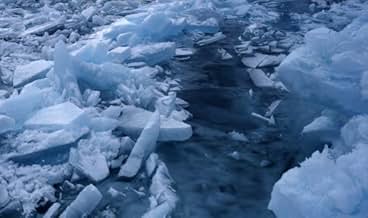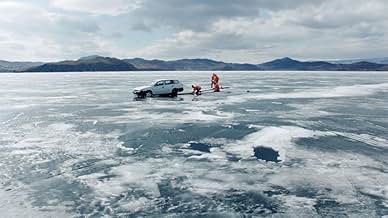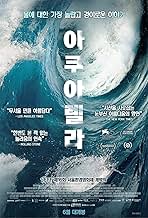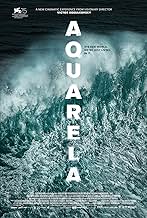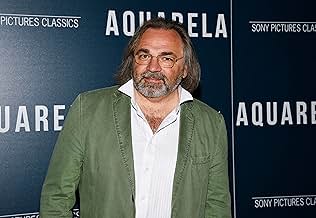CALIFICACIÓN DE IMDb
6.6/10
1.7 k
TU CALIFICACIÓN
Un espectáculo de agua y hielo alrededor del mundo en todas sus formas más poderosas.Un espectáculo de agua y hielo alrededor del mundo en todas sus formas más poderosas.Un espectáculo de agua y hielo alrededor del mundo en todas sus formas más poderosas.
- Dirección
- Guionistas
- Premios
- 1 premio ganado y 13 nominaciones en total
Opiniones destacadas
I really didn't like this movie. It starts off with some kind of rescue operation, with some very impressive imagery, but the lack of context and information render this section a bit pointless and hard to invest emotionally. The rest of the movie is just images of water around the world in various shapes and forms, again with no context or information. Movies like Koyaanisqatsi and Baraka come to mind while watching a movie like this, but the imagery in this movie, while good, pales in comparison with the before mentioned masterpieces, and if you're not invested emotionally the cinematography should be jaw dropping. But if you like to watch a movie while contemplating about your life and what groceries you need to shop for tomorrow's dinner, this is the movie for you.
Exquisitely filmed and orchestrated, highly absorbing and, on occasion, providing an overwhelming feeling of 'Mal de Mer' - that is until the floods and winds arrive that turns it into a saturated 'Mal de Fossil Fuels'. Let's leave them in the ground and avoid a wet and watery apocalyptic drowning - while hoping its not too late to avoid the deluge that's imminently upon us.
It can sometimes be unfair and difficult to criticize this kind of film. Yes, it´s pretty but nowadays most filmmakers can make such films. We should demand more of the best. Aquarela is a poetic documentary that focuses on the power and beauty of water around the world. The cinematography is impressive, and some of the shots are truly breathtaking. However, the film doesn't follow a traditional story or offer much context, which made it feel slow and a bit hard to stay engaged at times. It's more of an experience than a story driven documentary-great if you're into visuals and atmosphere, but it might not be for everyone looking for a clear narrative or deeper knowledge.
Greetings again from the darkness. This is not your father's Nature documentary. It's more like Mother Nature giving us a glimpse at her most beautiful, peaceful, ferocious and terrifying self. And it's just water. Simple H2O. Only it's not so simple. In fact, water takes many forms, and Russian filmmaker Victor Kossakovsky serves up some stunning water photography from around the globe.
The film begins with a rescue team working frantically to pull out a car that has fallen through the ice. When the camera finally does pull back, we see the vast space of the lake covered in ice. Other cars speed across the frozen body of water as if it's a sport or thrill for the driver. When another mishap occurs, we realize the tragedy is blamed on ice that has melted "3 weeks" earlier than usual. So we brace ourselves for another lecture on climate change.
It's a lecture that never comes. Surprisingly, there is no narrator. Perhaps Morgan Freeman signed a non-compete with the penguins. Kossakovsky allows the camera and nature to show the story, albeit with periodic musical accompaniment from composer Eicca Toppinen - sometimes with heavy metal chords, sometimes with soothing strings. Filmed in Greenland, Venezuela, Siberia (Lake Baikal), and Miami, Florida, where we see the effect of Hurricane Irma, water is shown in its glory. At times peaceful, at times violent. A sailboat captain fighting a storm might be followed by a breath-taking waterfall, which might be followed by a flooded town ... and even a swimming horse is photographed underwater.
Waves, glaciers, whales and dolphins combine for an unusual cinematic experience, and the most staggering sound comes courtesy of the ice moaning and water running. It's one best enjoyed with theatre screen and sound, and a film that will likely lose something even on the finest home systems. Filmed at 94 frames per second (rather than industry norm of 24 or 48), the visuals are truly breathtaking ... and sometimes disorienting. As George (on "Seinfeld") once said, "The sea was angry that day, my friend"; and now we have witnessed the anger for ourselves.
The film begins with a rescue team working frantically to pull out a car that has fallen through the ice. When the camera finally does pull back, we see the vast space of the lake covered in ice. Other cars speed across the frozen body of water as if it's a sport or thrill for the driver. When another mishap occurs, we realize the tragedy is blamed on ice that has melted "3 weeks" earlier than usual. So we brace ourselves for another lecture on climate change.
It's a lecture that never comes. Surprisingly, there is no narrator. Perhaps Morgan Freeman signed a non-compete with the penguins. Kossakovsky allows the camera and nature to show the story, albeit with periodic musical accompaniment from composer Eicca Toppinen - sometimes with heavy metal chords, sometimes with soothing strings. Filmed in Greenland, Venezuela, Siberia (Lake Baikal), and Miami, Florida, where we see the effect of Hurricane Irma, water is shown in its glory. At times peaceful, at times violent. A sailboat captain fighting a storm might be followed by a breath-taking waterfall, which might be followed by a flooded town ... and even a swimming horse is photographed underwater.
Waves, glaciers, whales and dolphins combine for an unusual cinematic experience, and the most staggering sound comes courtesy of the ice moaning and water running. It's one best enjoyed with theatre screen and sound, and a film that will likely lose something even on the finest home systems. Filmed at 94 frames per second (rather than industry norm of 24 or 48), the visuals are truly breathtaking ... and sometimes disorienting. As George (on "Seinfeld") once said, "The sea was angry that day, my friend"; and now we have witnessed the anger for ourselves.
Great Subject, maybe the greatest on this planet, drives you to great expectations, but at the end leaves you with great disappointment. I have personally been in some of the locations like Baikal, Arctic Ocean, Sweden, Canadian North Pacific, Great Lakes including Niagara Falls. I didn't have even a fraction of feelings I had compared to what was when I first been there.
¿Sabías que…?
- TriviaThe composer, Eicca Toppinen, is the main man of the Finnish cello-metal band, Apocalyptica.
- ConexionesReferenced in Vecherniy Urgant: Feduk/Sharlot (2019)
Selecciones populares
Inicia sesión para calificar y agrega a la lista de videos para obtener recomendaciones personalizadas
- How long is Aquarela?Con tecnología de Alexa
Detalles
- Fecha de lanzamiento
- Países de origen
- Sitio oficial
- Idiomas
- También se conoce como
- 水視界
- Locaciones de filmación
- Productoras
- Ver más créditos de la compañía en IMDbPro
Taquilla
- Total en EE. UU. y Canadá
- USD 307,346
- Fin de semana de estreno en EE. UU. y Canadá
- USD 24,753
- 18 ago 2019
- Total a nivel mundial
- USD 671,631
- Tiempo de ejecución1 hora 30 minutos
- Color
- Mezcla de sonido
- Relación de aspecto
- 2.35 : 1
Contribuir a esta página
Sugiere una edición o agrega el contenido que falta




